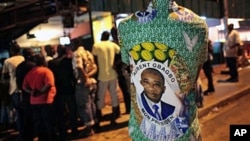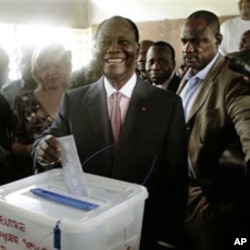Official campaigning kicks off Saturday for Ivory Coast's presidential runoff between current president, Laurent Gbagbo, and former prime minister, Alassane Ouattara.
Central Ivory Coast has emerged as the key battleground for the Nov. 28 presidential runoff between President Laurent Gbagbo and opposition leader Alassane Ouattara.
President Gbagbo led the first round of polling on October 31 with 38 percent of votes, dominating the country's east, west and southern regions. Mr. Ouattara came in second with 32 percent, with support concentrated in the north.
The election now hinges on winning over the 25 percent of voters that backed third-place candidate, former president Henri Konan Bedie. His supporters are concentrated in the center of the country, regions that are dominated by the Baoule ethnic group.
Bedie has publicly called on his supporters to back Ouattara, and the two held a rally in the country's political capital Yamoussoukro.
This election is the country's first presidential poll since the start of a rebel insurgency in 2002 that split the country between a government-held south and a rebel-held north.
Ivory Coast was West Africa's economic powerhouse, and many voters yearn for a return to country's golden age.
Jean Koudou, a businessman in Yamoussoukro, says they need peace. For the past ten years, he says, those of us who are self-employed have suffered because of the unstable economy and lost many opportunities.
Still, President Gbagbo may be able to attract Bedie voters who are uncomfortable with Ouattara. The former prime minister is from the country's largely Muslim north and was prevented from running for president in the past because of questions about his nationality.
President Gbagbo has accused Ouattara of being behind the 2002 rebellion. Though Ouattara has denied this, the accusations could influence voters.
Mr. Gbagbo says no country can prosper while at war, so that is why he is telling people not to go to war. He says the war is the reason that we have problems right now. He says why would a leader go to war against himself? He says they went to war and caused our country to be poorer.
There are fears that disagreements over the results of the run-off election could reignite violence.
Ivory Coast's military and rebel leaders announced Friday that they will deploy an additional 4,000 troops to rebel territory as part of the national election security force. That force is composed of half government troops and half rebel fighters and is responsible for securing the poll.
Some information for this report was provided by Reuters.





